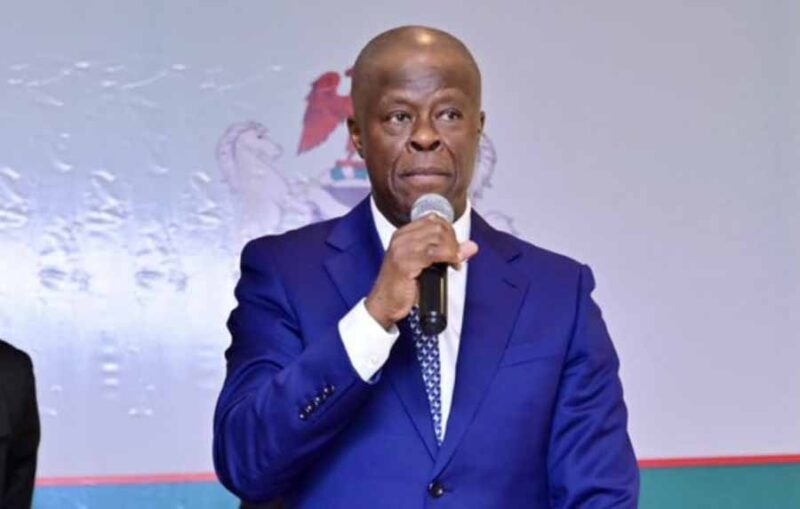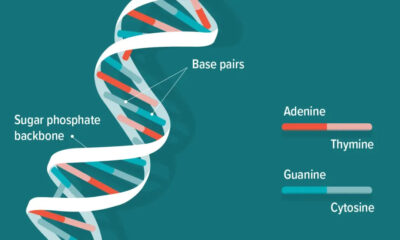News
DNA: Make paternity fraud punishable by law, Nigerians urge FG

News
Yahaya Bello reports to EFCC office with lawyers

Yahaya Bello reports to EFCC office with lawyers
A former Governor of Kogi State, Yahaya Bello, on Tuesday visited the Economic and Financial Crimes Commission (EFCC) to honour another invitation extended to him over alleged misappropriation of funds.
Bello went to the anti-graft office with his lawyers in the morning.
The ex-Kogi governor reportedly drove himself to the EFCC’s office in a black Toyota Hilux van with some lawyers.
He was said to have been taken by some operatives of the agency and are currently being grilled.
This is coming after the Supreme Court judgment which dismissed a suit brought by some state governments challenging the constitutionality of the agency.
The EFCC at the last hearing on November 14, sought the adjournment till November 27 in the fresh case it instituted against Bello.
It stated that the 30-day window was still running for the summons earlier issued.
News
Just in: Ebonyi governor suspends two commissioners, Perm Sec for misconduct

Just in: Ebonyi governor suspends two commissioners, Perm Sec for misconduct
Ebonyi State Governor Francis Nwifuru has announced the immediate suspension of two commissioners with a permanent secretary among others for gross misconduct.
Those suspended are the Commissioner for Housing and Urban Development Francis Ori, and the Commissioner for Health, Moses Ekuma, with the Permanent Secretary of the Ministry of Health.
The suspension followed an incident on Saturday night, when the governor reportedly visited the Ministry of Health’s premises and was said to have found six officials diverting government materials.
Others suspended for three months are the Executive Secretaries of the State Primary Healthcare Development Agency and the Ebonyi State Health Insurance Agency
The suspension order was announced by the state Commissioner for Information, Jude Okpor, who cited alleged misconduct and dereliction of duties as the reasons for the disciplinary actions.
Okpor made the disclosure on Tuesday during a press briefing on the outcomes of the State Executive Council meeting held on Monday at the New Government House in Abakaliki, the state capital.
“Following cases of gross misconduct and dereliction of duties by some government officials and matters related thereto, the Chairman of Council directed the indefinite suspension of the Honourable Commissioner for Housing and Urban Development and three months suspension of the Honourable Commissioner for Health, respectively
“In view of the development, the Special Assistant to the Governor on Primary Health was directed to take charge of the ministry in the absence of the suspended commissioner.
Governor Nwifuru directed the suspended government officials to hand over all government properties in their possession including vehicles to the Secretary to the State Government.
News
Why we’re borrowing despite surplus revenues – FG

Why we’re borrowing despite surplus revenues – FG
The Federal Government has defended its decision to borrow to address budget deficits, despite surpassing revenue targets in 2024.
Finance Minister Wale Edun and Budget Minister Atiku Bagudu clarified this position during a session with the National Assembly’s Joint Committee on Finance, Budget, and National Planning. The meeting focused on the 2025–2027 Medium-Term Expenditure Framework (MTEF) and Fiscal Strategy Paper (FSP).
Last week, the National Assembly approved President Bola Tinubu’s $2.2 billion loan request to fund the N9.7 trillion deficit in the 2024 budget partially.
During the session, key agency heads, including Nigerian National Petroleum Company Limited (NNPCL) CEO Mele Kyari, Customs Comptroller-General Bashir Adeniyi, and Federal Inland Revenue Service (FIRS) Chairman Zacch Adedeji, presented their revenue reports.
The agencies reported exceeding their 2024 targets.
- Customs Service: Generated ₦5.352 trillion by September 30, surpassing its ₦5.09 trillion target for the year. For 2025, the agency projects ₦6.3 trillion, with a 10% increase planned for 2026.
- NNPCL: Achieved ₦13.1 trillion in revenue, exceeding the ₦12.3 trillion projection for 2024. Kyari announced a ₦23.7 trillion revenue target for 2025.
READ ALSO:
- Mixed reactions trail moves to privatise PH, Warri, Kaduna refineries
- Ronaldo’s brace propels Al Nassr toward AFC champions league quarters
- Nigeria would have been better under Peter Obi, too much nepotism under Tinubu – Senator Abaribe
- FIRS: Surpassed multiple tax collection goals, including ₦5.7 trillion from company income tax against a ₦4 trillion target. Education tax collections also exceeded expectations, reaching ₦1.5 trillion compared to a ₦70 billion target.
Overall, ₦18.5 trillion of the ₦19.4 trillion 2024 revenue target had been achieved by September, indicating the goal will be exceeded by year-end.
Despite these surpluses, the government insists borrowing remains essential to cover budget gaps and support vulnerable populations.
Bagudu explained, “Even with agencies exceeding revenue targets, borrowing is necessary to address deficits and boost productivity, particularly for the poorest. This aligns with Agenda 2050, which aims for a GDP per capita of $33,000.”
Edun also reiterated that loans were critical for adequately funding the budget.
The committee, led by Senator Sani Musa, questioned the rationale behind the borrowing and demanded further transparency. The Immigration Service was specifically asked to provide documents regarding an “unacceptable PPP arrangement” before the end of the week.
The session underscored the government’s balancing act between increased revenues and fiscal challenges requiring external borrowing.
Why we’re borrowing despite surplus revenues – FG
-

 metro20 hours ago
metro20 hours agoBREAKING: Port Harcourt refinery begins operation
-

 Business3 days ago
Business3 days agoJust in: Dangote refinery reduces petrol price for marketers
-

 metro2 days ago
metro2 days ago40-foot container falls on car in Lagos
-

 Politics3 days ago
Politics3 days ago2027: Lagos Speaker, Obasa joins gov race, may battle Seyi Tinubu, others
-

 Politics2 days ago
Politics2 days agoLagos 2027: Seyi Tinubu campaign team releases his life documentary
-

 International2 days ago
International2 days agoTrump to sack 15,000 transgender officers from U.S. military: Report
-

 Entertainment2 days ago
Entertainment2 days agoPolygamy best form of marriage for Africa – Okey Bakassi
-

 Education13 hours ago
Education13 hours agoUS University opens 2025 scholarships for international students












